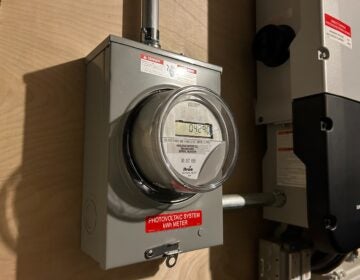Republican lawmakers from Pa., N.J., Va. and Md. weigh solutions to rising electricity bills
Republican lawmakers want to see faster permitting and an end to the Regional Greenhouse Gas Initiative.

FILE - A data center owned by Amazon Web Services, front right, is under construction next to the Susquehanna nuclear power plant in Berwick, Pa., on Jan. 14, 2025. (AP Photo/Ted Shaffrey, file)
This story is part of the WHYY News Climate Desk, bringing you news and solutions for our changing region.
From the Poconos to the Jersey Shore to the mouth of the Delaware Bay, what do you want to know about climate change? What would you like us to cover? Get in touch.
Republican lawmakers from across the mid-Atlantic region gathered in Harrisburg on Tuesday to discuss possible solutions to rising electricity costs and concerns around grid reliability, including cutting red tape for power generators and eliminating policies that aim to reduce planet-warming carbon emissions.
“Families, businesses and communities across Pennsylvania, Maryland, New Jersey and Virginia are all feeling the same pressure,” said state Rep. David Rowe, chair of the Pennsylvania House Republican Policy Committee, during a hearing Tuesday. “We share the same regional grid, the same transmission lines and the same responsibility to keep the lights on.”
Tuesday’s committee hearing came amid growing concern across the political aisle about electricity costs and power supply in the region. Public officials from both parties agree that more needs to be done to curtail rising costs for families and get new sources of power connected to the grid faster. But they disagree about how to get there.
During Tuesday’s hearing, Republican lawmakers from Pennsylvania, New Jersey, Maryland and Virginia asked for policy guidance from two fossil fuel industry representatives, a conservative think tank, an electricity consumer advocate and a representative of the regional grid operator, PJM Interconnection.
Why are electricity prices rising?
Electricity prices have shot up in the past year, rising nearly 15% in Pennsylvania, 19% in New Jersey and more than 7% in Delaware, according to a Washington Post analysis of federal government data.
A recent study by the Lawrence Berkeley National Laboratory found that the main driver of electricity bill increases through 2024 was costs associated with the infrastructure needed to transport electricity to the end user, not the costs of generating the electricity itself.
In the mid-Atlantic, part of the price hike has come from a spike in PJM’s capacity auction prices. The regional grid manager uses this auction to guarantee that energy producers will contribute enough power to the grid to meet projected demand in the future. The independent market monitor for the PJM region, Monitoring Analytics, identified rising demand due to the growth of data centers as the “primary reason” prices soared in last year’s capacity auction.
During Tuesday’s hearing, Republican lawmakers from the region blamed the rising prices on policies that encourage sources such as wind and solar, as well as environmental regulations they say forced the closure of fossil fuel-burning power plants.
The recent Lawrence Berkeley National Laboratory study supports some of this assessment. It found that renewable energy in the absence of mandates did not raise costs, but renewable portfolio standards — policies that require energy suppliers to source a minimum amount of renewable energy — did play a role in price increases in some states. New Jersey’s standard, for example, raised electricity prices between 2019 and 2024 by roughly 1 cent per kilowatt-hour, according to the Washington Post.
Shapiro and Pennsylvania Republicans clash on solutions to energy issues
Democrat Gov. Josh Shapiro shares many of the Republicans’ concerns, but is pushing potential solutions they oppose.
His administration appealed a court’s decision to stop the state from joining the Regional Greenhouse Gas Initiative, or RGGI, a cap-and-trade program for power plant emissions. The case is still awaiting a decision before the state Supreme Court. Meanwhile, Republicans and some Democrats in the state Senate passed a bill repealing the state’s participation in RGGI.
Rowe described the possibility that Pennsylvania could eventually join the initiative as a “sword of Damocles,” scaring would-be energy developers to other states.
“Nobody wants to come here to invest billions of dollars in generation knowing that if RGGI is upheld by the Supreme Court, there’s a billion dollar tax dropped on them,” he said.
Shapiro is pushing a slate of other energy proposals dubbed the “Lightning Plan,” aimed at speeding up the development of both renewables and fossil fuels, reducing climate pollution and subsidizing households’ electricity bills. Part of the plan — a tax credit that would offer as much as $100 million for companies developing “new, reliable energy sources” in Pennsylvania — passed the state House in May, with most Republicans, including Rowe, voting against it.
Shapiro’s plan also includes a state-level version of RGGI, which would return the majority of the revenue it generates to households as electric bill rebates. A study found this program, alongside Shapiro’s plan to update Pennsylvania’s Alternative Energy Portfolio Standards, would lower families’ bills, attract private investment to the state and reduce carbon emissions.
Representatives of the conservative Commonwealth Foundation and the Pennsylvania Coal Alliance told House Republicans Tuesday they oppose these policies.
“Anything that encourages one source over another in the market, I think, is irresponsible,” said Rachel Gleason, executive director of the Pennsylvania Coal Alliance.
Rowe said he thinks the state-level RGGI alternative would result in higher costs passed along to consumers.
“Ratepayers will be picking up that tab,” he said.
What do mid-Atlantic Republicans want?
After Tuesday’s hearing, Republican lawmakers from the region called for an end to policies aiming to reduce climate pollution from the electricity sector.
“We want out of RGGI,” said Robin Grammer, a Republican in Maryland’s House of Delegates, during a press conference following the hearing. “We want out of the clean energy mandates.”
In Pennsylvania, Rowe said he wants to see the state speed up its permitting process for new energy projects and reduce the number of regulations power producers face.
“Without Pennsylvania energy, the lights in Maryland, New Jersey and Virginia, they just simply go out,” he said. “If we are not able to meet the demand of new industries, grow Pennsylvania’s energy generation, we are going to be in a very rough spot.”
Rowe supports a bill passed by Senate Republicans and two Senate Democrats this month that would result in permit applications being automatically approved if state agencies do not make decisions on them in a certain amount of time, or refer them to a third party for consideration. He also supports a bill in the state Senate that would create a “Pennsylvania DOGE,” a state-level equivalent to the federal Department of Government Efficiency, to review all regulations and recommend some to the legislature for repeal or revision.
Republicans hold a minority of seats in Pennsylvania’s House of Representatives, so they would need support from Democrats to pass legislation through the chamber.

Get daily updates from WHYY News!
WHYY is your source for fact-based, in-depth journalism and information. As a nonprofit organization, we rely on financial support from readers like you. Please give today.







